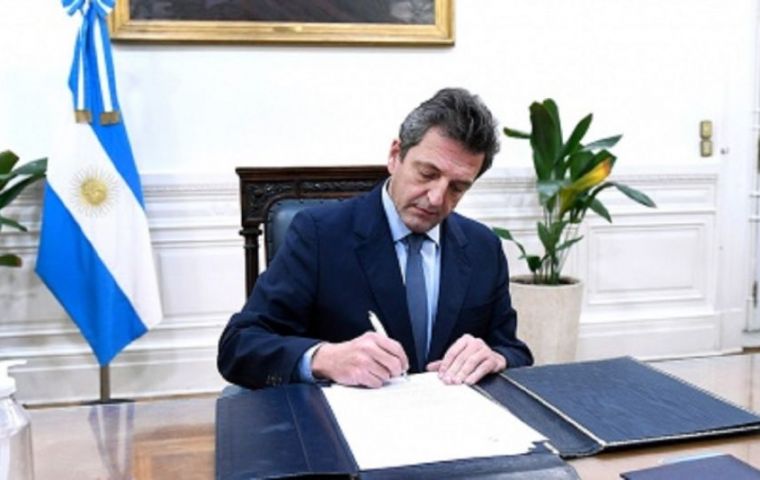MercoPress. South Atlantic News Agency
Argentina: “Blue” dollar goes back up after Massa's new measures
 The unofficial dollar reached AR$ 483 on Monday after Sunday's announcements
The unofficial dollar reached AR$ 483 on Monday after Sunday's announcements As Argentina raised the interest rate to 97% and adopted other measures such as the opening of food imports to control inflation while at the same time further restricting people's access to foreign currency, the “Blue” (a euphemism for “black market”) dollar rose again Monday to AR$ 483, it was reported in Buenos Aires.
In the meantime, the International Monetary Fund (IMF) is “evaluating the measures,” according to an agency spokesperson who added that “at this time we continue to discuss ways to strengthen the program and safeguard stability in the face of the severe drought.”
“As we said earlier, this includes policies to improve fiscal sustainability and strengthen buffers, both of which are essential to reduce inflation while protecting the most vulnerable,” the source added.
In this scenario, the wholesale dollar closed at AR$ 230.70, and the dollar with the 30% surcharge of the PAIS tax averaged AR$ 313.79 per unit. With the 35% advance payment on account of the Income Tax on the purchase of foreign currency, it was quoted at AR$ 398.28, while for transactions abroad it stood at AR$ 422.41 and with the additional tax for purchases over US$ 300 it reached AR$482.76.
Massa will travel to China later this month to the BRICS bank meeting chaired by Dilma Rousseff, where he will seek collaterals to finance Brazilian exports to Argentina. He is expected to then travel to Washington DC to sign a new, modified agreement, with the IMF.
Economists consulted in Buenos Aires by Xinhua agreed that Massa's measures are attacking “the consequences” and “not the causes of inflation” in a move to “promote consumption and production” and “avoid a higher level of deterioration in the run-up to the [presidential] elections.”
Read also: Argentina to import food to curb price hikes




Top Comments
Disclaimer & comment rules-

Read all commentsGlad to hear everything's looking up!
May 18th, 2023 - 01:54 am 0Commenting for this story is now closed.
If you have a Facebook account, become a fan and comment on our Facebook Page!